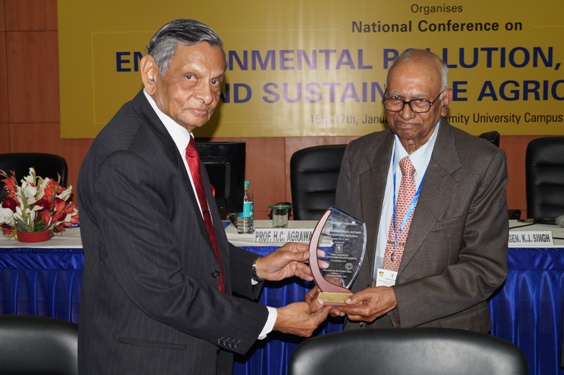17 Jan 2013|Noida | Amity University Campus, Sector-125, Noida
“Over 120 million hectare area is affected by land degradation in India”, says Dr G.S. Sidhu – Principal Scientist & Head National Bureau of Soil Survey during Valedictory Ceremony of National Conference on Environmental Pollution at Amity

Environmental degradation is not only a national or local issue but a universal concern which touches the lives of all individuals. To address the various issues of soil toxicology, environmental pollution and its impact on soil ecosystem, Amity Institute of Environmental Toxicology, Safety and Management (AIETSM) in association with Indian Network for Soil Contamination Research (INSCR) and University of Delhi organized three days National Conference on Environmental Pollution, Soil Health and Sustainable Agriculture’ from January 15 - 17, 2013 at Amity University Campus, Sector – 125, Noida.
Over 87 Research Papers, 26 verbal and poster presentations apart from deliberations from Scientists, Research Scholars and Academicians were the main highlights of the National Conference.
Valedictory Ceremony of the conference was held on January 17, 2013 which was graced by Dr. G.S. Sidhu, Principal Scientist & Head National Bureau of Soil Survey & Land Use Planning, Maj. Gen. K. Jai Singh, Group Vice Chancellor – Amity University, Dr. Tanu Jindal- Director, AIETSM, Prof. H.C. Agarwal, Vice President, INSCR & Dr. S.V. Eswaran, Emeritus Scientist CSIR and Honorary Prof. AIETSM.
Delivering his valedictory address, Dr. G.S. Sidhu, Principal Scientist & Head National Bureau of Soil Survey & Land Use Planning said that Soil constitutes a vital component of natural environment and is important for the existence of any civilization. Sharing some interesting statistical figures, Dr. Sidhu revealed that India has 17% of world’s population and around 52% of them are engaged in agriculture India shares 11% of world’s live stock and 4% of world’s water. While depicting the growth of agriculture in India, Dr. Sidhu said that our country is primarily agricultural dominant economy and its growth can be traced in three phases. Mid 1960 when there was low input resulting in low production. Period between 1960-1990 witness green revolution which resulted in high yield production. Period after 1990 saw the over exploitation of resources which result in soil degradation, lowering of ground water level and environmental pollution. Dr. Sidhu stressed that presently India needs 240 Kg of food grain per capita per year. It is estimated that by year 2025, 329 million tones of food grains will be required in India, which is a matter of grave concern given the fact that around 120 million hectare area is already affected by land degradation in India and in Punjab ground water level is decreasing at an alarming rate of 1 meter per annum which can multiply into the severity of soil degradation.
Maj. Gen. K. Jai Singh, Group Vice Chancellor – Amity University said that soil is very important constituent of ecosystem which supports the growth and distribution of plant species and provides a habitat for a wide range of organisms like bacteria, fungi, protozoa, arthropods, nematodes, earthworms and insects. Maj. Singh averred that Soil is looked upon as the foundation for civilization, but with the constant industrialization, it is being constantly damaged. Indiscriminate dumping of pesticides, chemical fertilizers into soil or seepage of large number of pollutants from water or air into the soil; contaminate and adversely affect the fertility of soil.
Prof. H.C. Agarwal, Vice President, INSCR said that environmental pollution is the biggest threat to our agriculture sector. To meet our energy requirements we are building dams all over the country. One of the residual product generating out of these dams is fly ash which is a major pollutant. This fly ash not only pollute water but also soil. Distilleries are also major water and soil pollutant. Prof. Agarwal stated that it is a challenge for all of us to combat with the environment pollution. He appealed to all the students, scientists and research scholars to work collectively to fight the menace of soil degradation and environmental pollution.
During the occasion, Awards for Best Paper and Poster Presentation were also announced. Dr. P. Vamshi Krishna- WWF India, Dr. Nidhi Kandelwal from Jawaharlal Nehru University and Dr. Nalini Ramawat, Amity University won the Best Paper Presentation Awards. Dr. Kalpana Malik, Dr. Gulati K Thakur, Dr. Neha Neharika Singh won the best Poster Presentation Awards.
Dr. Sunil Saran, Vice President – Amity Science Technology & Innovation Foundation, Dr. R.P. Singh, Advisor – Amity Institute of Nano Technology, Dr. BKP Sinha, Advisor – Amity School of Natural Resources & Sustainable Development were also present alongwith students, research scholars, academicians and senior officials of Amity University.